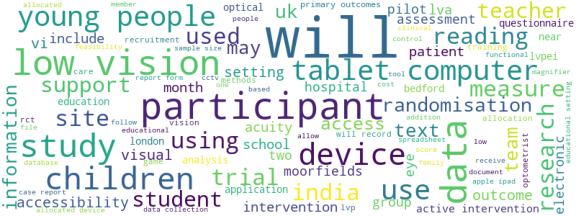| Id | 591 | |
| Author | Crossland M.D., Thomas R., Unwin H., Bharani S., Gothwal V.K., Quartilho A., Bunce C., Dahlmann-Noor A. | |
| Title | Tablet computers versus optical AIDS to support education and learning in children and young people with low vision: Protocol for a pilot randomised controlled trial, CREATE (Children Reading with Electronic Assistance to Educate) | |
| Reference | Crossland M.D., Thomas R., Unwin H., Bharani S., Gothwal V.K., Quartilho A., Bunce C., Dahlmann-Noor A.; Tablet computers versus optical AIDS to support education and learning in children and young people with low vision: Protocol for a pilot randomised controlled trial, CREATE (Children Reading with Electronic Assistance to Educate) ;BMJ Open vol:7 issue: 6 page: |
|
| Link to article | https://www.scopus.com/inward/record.uri?eid=2-s2.0-85021094209&doi=10.1136%2fbmjopen-2017-015939&partnerID=40&md5=db03fb49a25e8266601c323cfed0b115 |
|
| Abstract | Introduction Low vision and blindness adversely affect education and independence of children and young people. New assistive technologies such as tablet computers can display text in enlarged font, read text out to the user, allow speech input and conversion into typed text, offer document and spreadsheet processing and give access to wide sources of information such as the internet. Research on these devices in low vision has been limited to case series. Methods and analysis We will carry out a pilot randomised controlled trial (RCT) to assess the feasibility of a full RCT of assistive technologies for children/young people with low vision. We will recruit 40 students age 10-18 years in India and the UK, whom we will randomise 1:1 into two parallel groups. The active intervention will be Apple iPads; the control arm will be the local standard low-vision aid care. Primary outcomes will be acceptance/usage, accessibility of the device and trial feasibility measures (time to recruit children, lost to follow-up). Exploratory outcomes will be validated measures of vision-related quality of life for children/young people as well as validated measures of reading and educational outcomes. In addition, we will carry out semistructured interviews with the participants and their teachers. Ethics and dissemination NRES reference 15/NS/0068; dissemination is planned via healthcare and education sector conferences and publications, as well as via patient support organisations. © 2017 Article author(s). |
|
| Keywords | Adolescent; Assistive technology; Child; Low vision; Vision |
Wordcloud:



